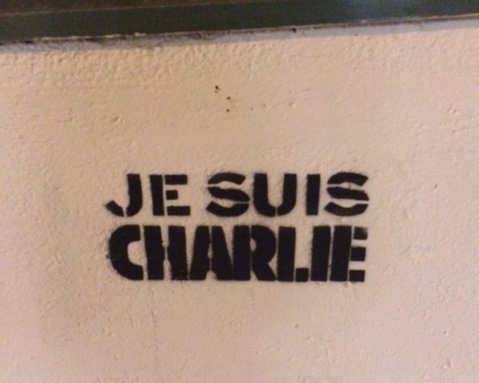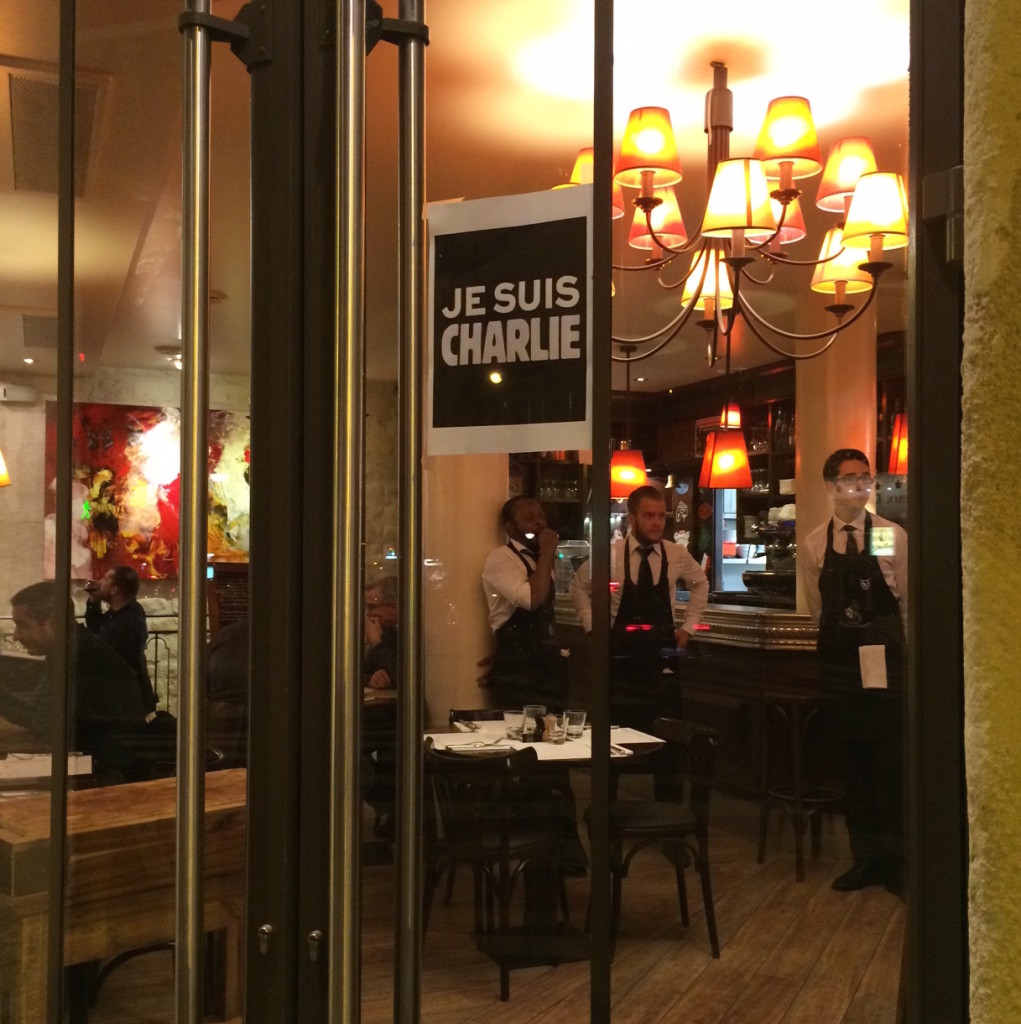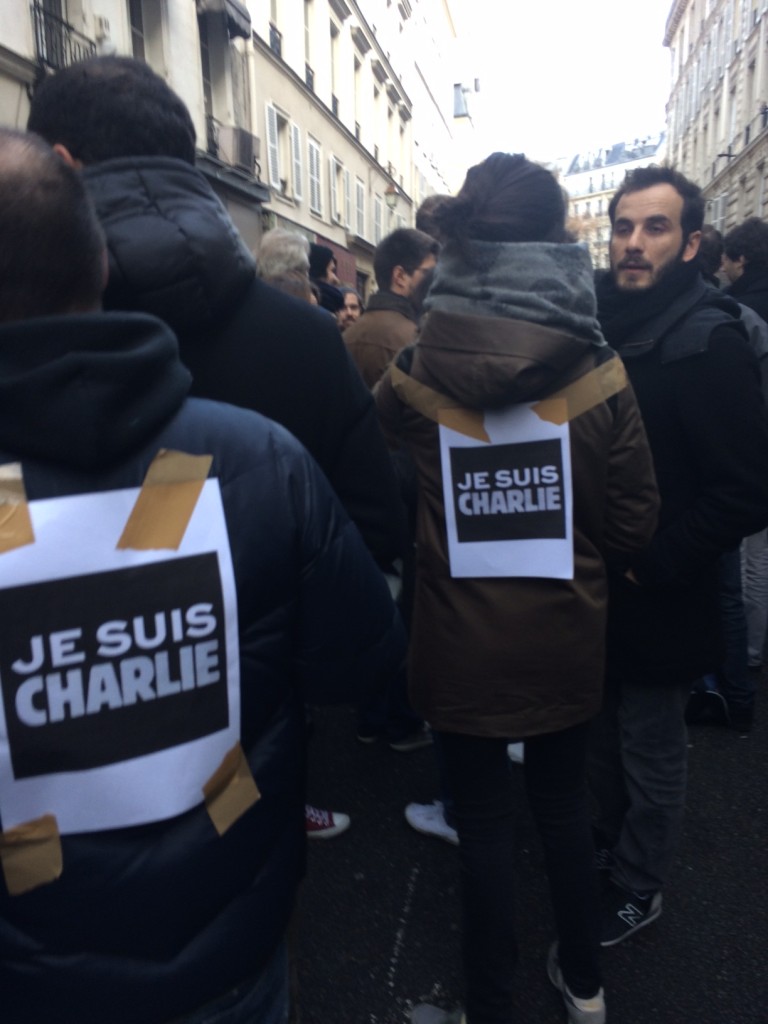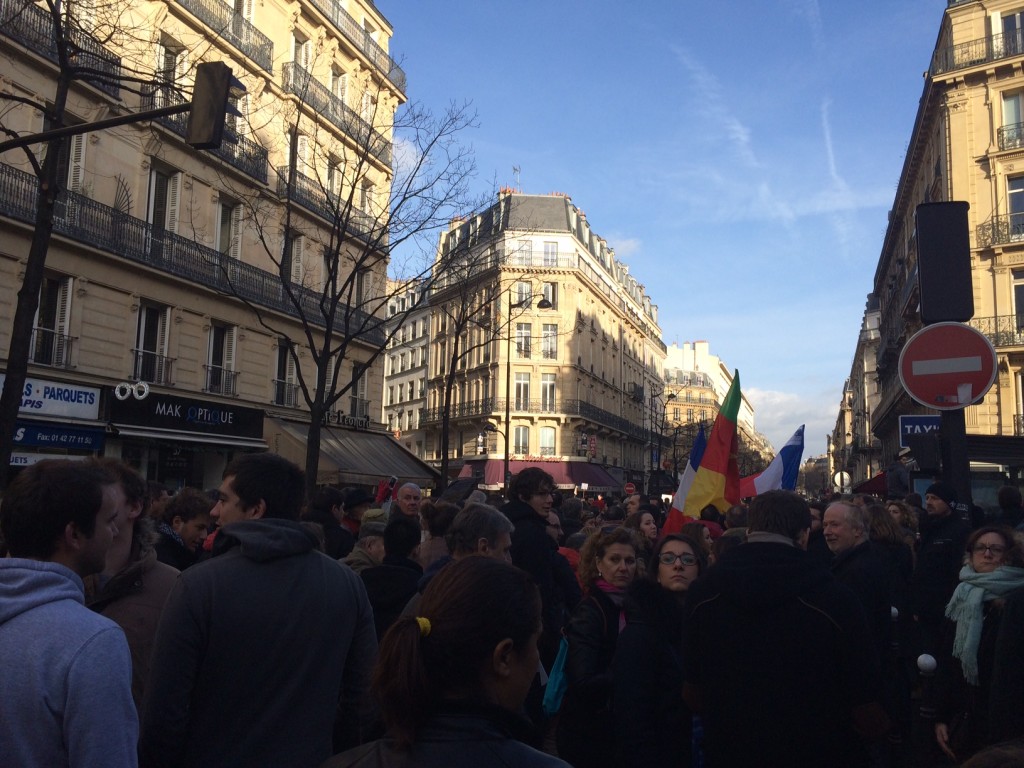Non-stop sounds of police sirens, hundreds of posters reading “Je Suis Charlie” pasted on shop windows, and constant text messages from my worried mother—these elements defined my first days in Paris as of January 7th. I’d expected to spend the first two weeks of 2015 enjoying cafes, museums, and gardens in the famous City of Light, but after the now widely-covered attacks on Charlie Hebdo’s staff, what I ended up experiencing was the anxiety and emotional turbulence that happens when you’re close to terrorism.
I arrived in Paris on January 3rd as a student in NYU’s low-residency MFA program for creative writing. My first few days went just as expected—they were filled with walks around Paris, dinners with friends, and writing lectures from distinguished novelists and poets.
On my fifth day, the day of the attacks, I woke up late and headed to class with no idea of what had happened. It was only in the middle of workshop at almost 2pm, when I started receiving long messages from my frantic mother, that I heard the news. Suddenly the endless wail of sirens outside that my teacher was trying hard to ignore made sense.
Admittedly, when I first heard about what had happened, I didn’t think it would be nearly as big of a story as it ended up being. With how commonplace shootings have become in America, I think I was a bit desensitized to it. Sure, a shooting resulting in twelve fatalities would be national news in the United States, but with the amount of school shootings, street shootings, mall shootings, drive-by shootings and all of our other subgenres of shootings, I didn’t realize that this particular shooting was different or that I was about to witness a country facing a huge moment in its history. I also didn’t think it would become one of the biggest, if not the biggest, news story in the world for the following week.
I felt uneasy being in a creative writing school after a group of journalists had been murdered, and the attack against free speech was something that shook me up, but for the most part I was able to get on with my day as I normally would have. When I got back to my hotel that night and I checked my regular news sources and signed onto Twitter to see how the international community was reacting, I started to realize that the situation was much bigger than I had previously grasped. France has very strict gun laws, and shootings like this are rarely seen there. Though one suspect had turned himself in, the two others were on the run; there was a huge manhunt going on outside. I could hear the sirens outside my hotel windows all night.
The next morning I was woken up by a breaking news alert on my phone (which I’d activated the night before) saying that a female police officer had been killed and a street sweeper injured by another assailant with a gun. Immediately I started to feel more uncomfortable. While officials were urging the public not to jump to conclusions, it seemed that this other gunman was associated with the previous day’s attackers.
As I walked to school, I passed multiple businesses with a simple black paper reading “Je Suis Charlie” in white font taped on their front windows or doors.
In our first workshop during that second day, our professor began the class by asking for our thoughts on everything that had happened. Immediately the diversity of reactions became evident. One classmate was unsure if she wanted to march in the upcoming unity rally because she felt uneasy with Charlie Hebdo’s brand of humor and its attacks on minorities. I voiced discomfort when the phrase “political correctness” was brought up. Others expressed that they felt that satire and free speech should be defended regardless of whether we agree with it or not. I quickly got a small real-life sample of what the general public would be debating for the upcoming weeks.
Later that day we were given a great talk about how to enjoy Paris by two French staff members of the bookshop Shakespeare in Paris. They started and ended their lecture with passionate words about their pride in free speech and how violent the attacks felt on their French values. One explained that the first thing children are taught in school is the concept of free speech—that they must support another person’s right to speak their opinions, regardless of whether they agree with said opinion. She urged us all to write about the incident.
These two women were the first Parisians whose reactions to Charlie Hebdo I’d gotten to see firsthand. The streets of France had so far maintained a sense of normalcy and calm—at least where I was staying in the 5th arrondissement, about a twenty-minute drive from the 11th arrondissement where the attack took place. I’d looked carefully at Parisians as they walked, drove, ate, and sold things, and for the most part, everyone seemed to be going about their business as they usually would. I saw people having conversations and laughing and eating with friends at cafes as if they were far from a city under attack— which is not to say that there were no traumatized people in Paris. A few of my classmates were shamed on the trains for laughing loudly, asked by a stern woman, “Do you know twenty people died today?”
The Paris I observed during the days of these terrorist attacks was the same busy, happy Paris I’d seen on all my previous trips there. The only difference was that all everyday activities took place under the nonstop blaring sirens of police cars and with French flags raised at half-mast visible on some buildings. And of course, “Je Suis Charlie” signs multiplied by the hundreds as each day passed—on shop doors, car windows, people’s shirts, even bread.
On January 9th, the third day of the attacks, was when I began to really feel the anxiety and heaviness of the situation. I was again bombarded with text messages from my mother during class telling me that two hostage crises were taking place, one with two Charlie Hebdo suspects and another with the man who had shot a female police officer on the previous day. With different murders taking place on three consecutive days—and with attacks spreading to innocuous places like food markets, the danger Paris was in finally started to hit me. I think that on the first day, several classmates and I convinced ourselves that the attack on the Charlie Hebdo offices was an isolated incident since it occurred for a very specific reason. We didn’t think there would be more violence around the city. With things growing increasingly chaotic, and with the killing seeming to continue indefinitely, I finally started to feel nervous enough to fear for my life as I walked the streets.
Once the two hostage situations came to an end, and once all three assailants were dead, I didn’t feel a sense of relief. On the contrary, all I could wonder is what would happen next. I worried that more of their associates were on the loose planning more attacks. I worried about getting yet more text messages on the following morning telling me about yet another set of killings. Mostly though, I just felt sad. As one of my friends put it, “Paris is this beautiful place, and it’s like something like this just can’t exist in the world anymore. Or has to fight to.” For me it extended not just to Paris, but every place where terrorism brought death and disruption of peace.
Fortunately no new attacks happened in the days following January 9th. Two days later, after some debate as to whether it was safe enough to go, I decided to go to the huge unity rally with a classmate. The trains were free that day and it felt as if the entire country of France was flooding to the same location. Thousands of people carried “Je Suis Charlie” signs and French flags. Some non-French marchers carried flags from their own countries to show solidarity.
Once outside, the atmosphere was an inspiring one. Everyone looked proud and happy and there was no fear anywhere. Every time police cars would drive by, the crowd stopped to clap loudly and whistle and cheer them on. They sung the French national anthem and waved flags and chanted several phrases, none of which I could understand. At one point I saw a group of Muslim marchers showing support, and I couldn’t help but wonder if they felt afraid to be there, but luckily no one showed any hostility toward them.
When it was all over, I felt my spirit lifted, but I couldn’t help but wonder that night where everything would go from there. I had seen so many people reacting passionately on the opposite ends of each issue involved. There were those who said all free speech must be protected, while others argued that Charlie Hebdo’s jokes qualified as hate speech, which should not be protected. I had seen people insist that this was an issue rooted in Islam, while others said it was all caused by politics, racism, and imperialism. I had read reports of France ramping up its security all over the country and enforcing stricter rules for any published material or spoken speech that might be interpreted as condoning terrorism. I had also read reports of the Muslim population of France and all of Europe feeling frightened about prejudice against them intensifying.
The march was a momentary relief, however it did not mark the end of the terrorism. It was not the solution. The French government would soon be acting on bringing a concrete solution. With all the clash I’d witnessed, I knew that this would not be solved quickly or easily. Or ever.
•
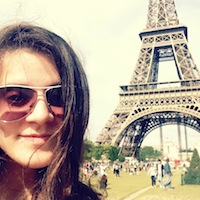 Natasha Guzman is a freelance writer and Associate Editor at The Brooklyn Quarterly. She graduated from Pratt Institute with a BFA in Writing and primarily focuses on creating fiction.
Natasha Guzman is a freelance writer and Associate Editor at The Brooklyn Quarterly. She graduated from Pratt Institute with a BFA in Writing and primarily focuses on creating fiction.

